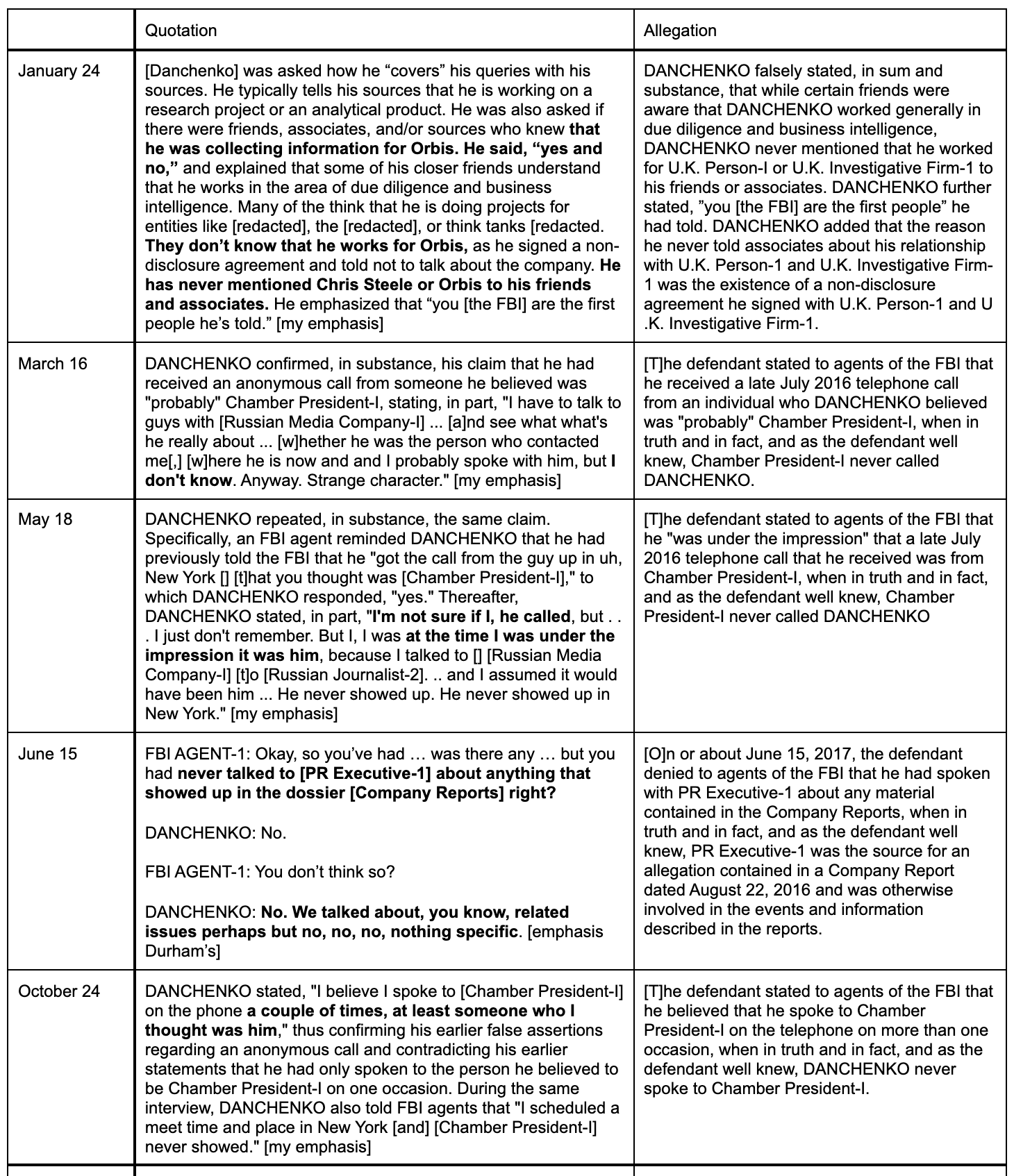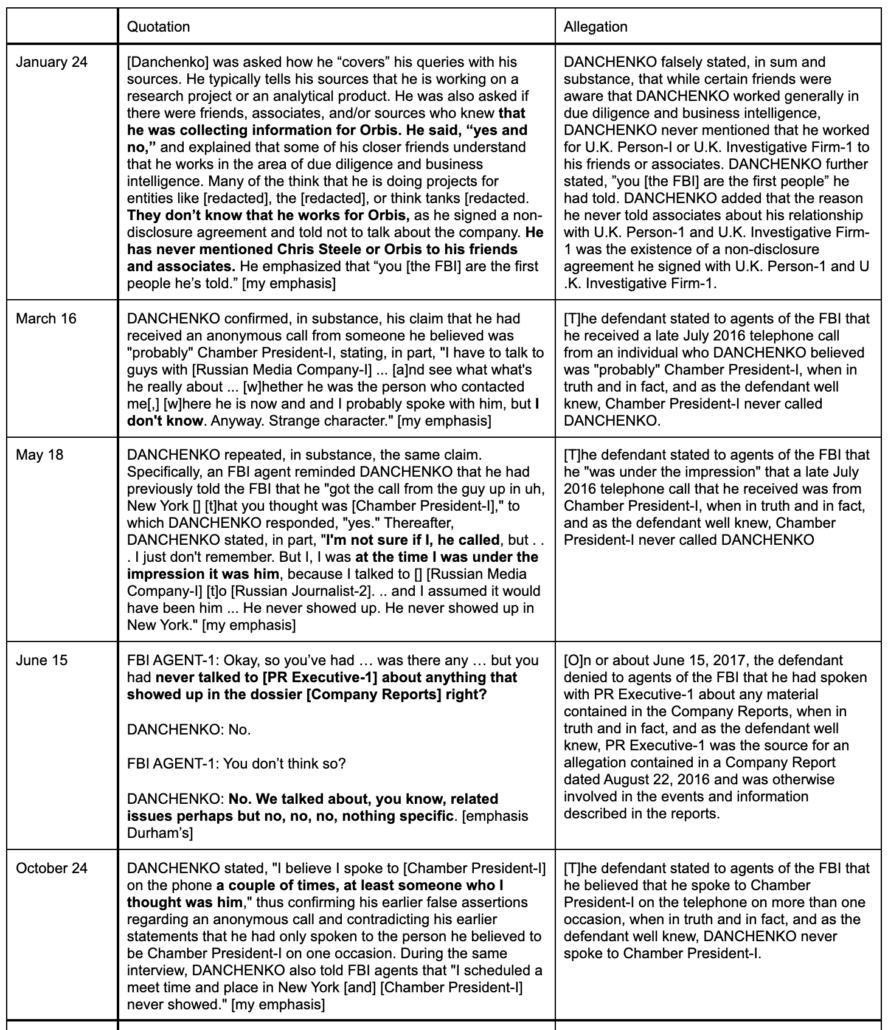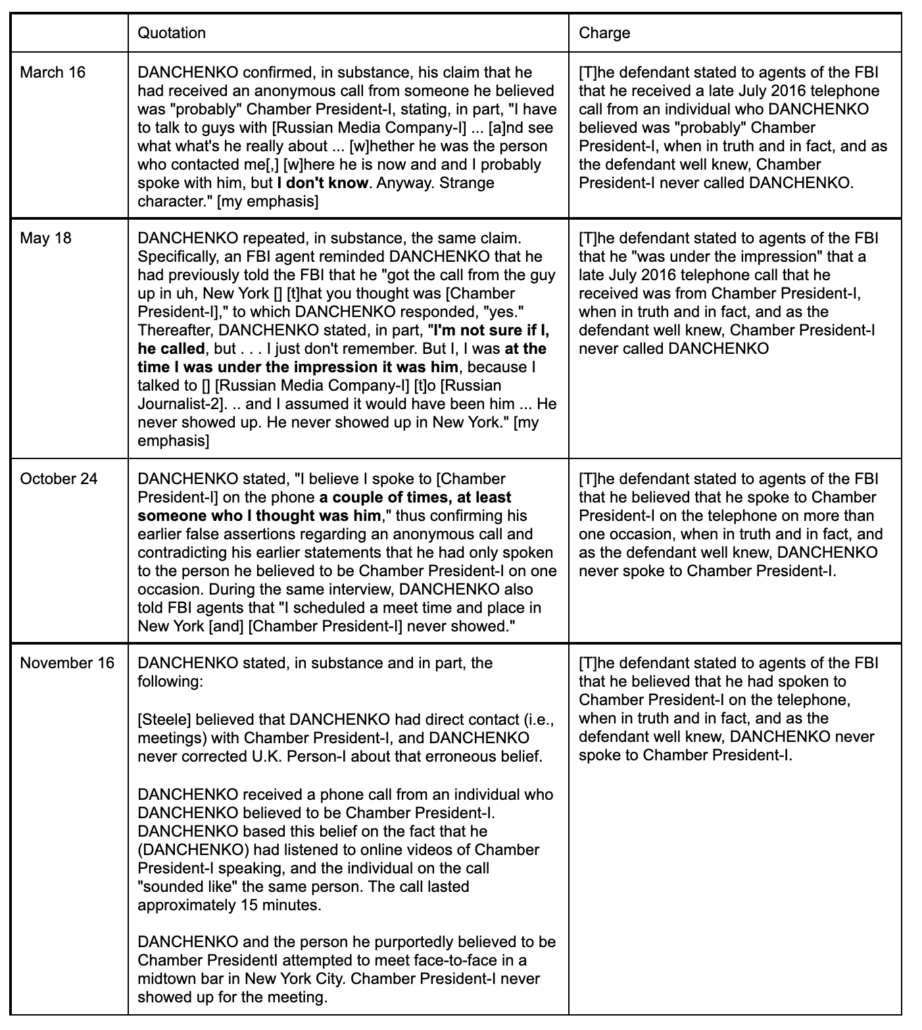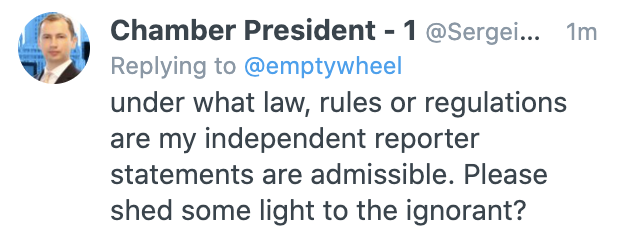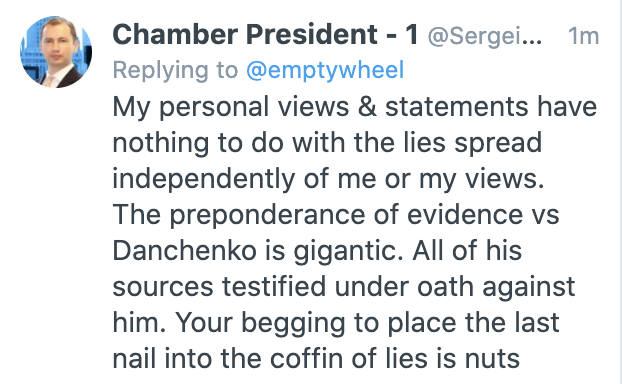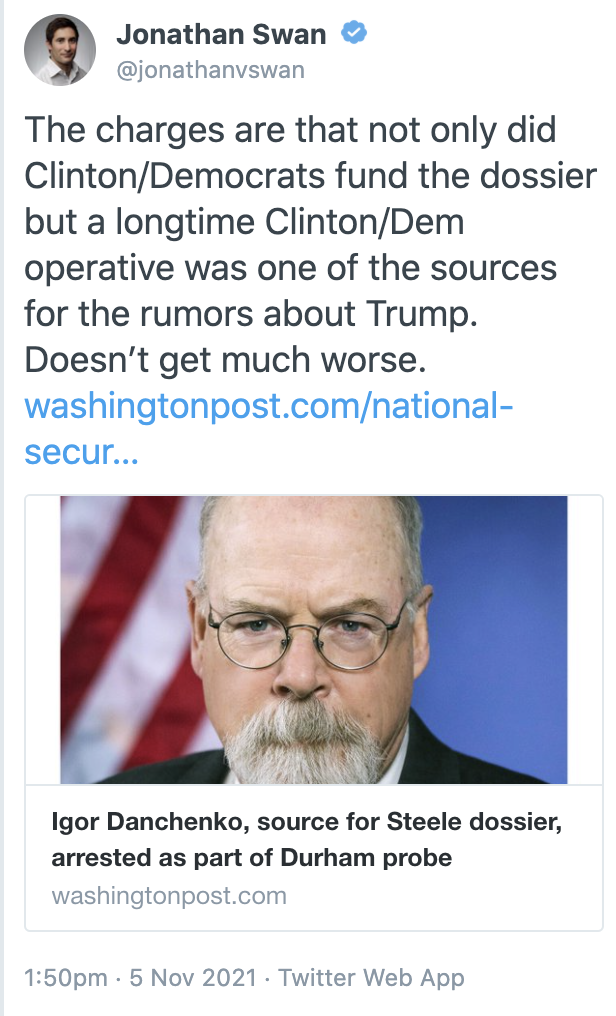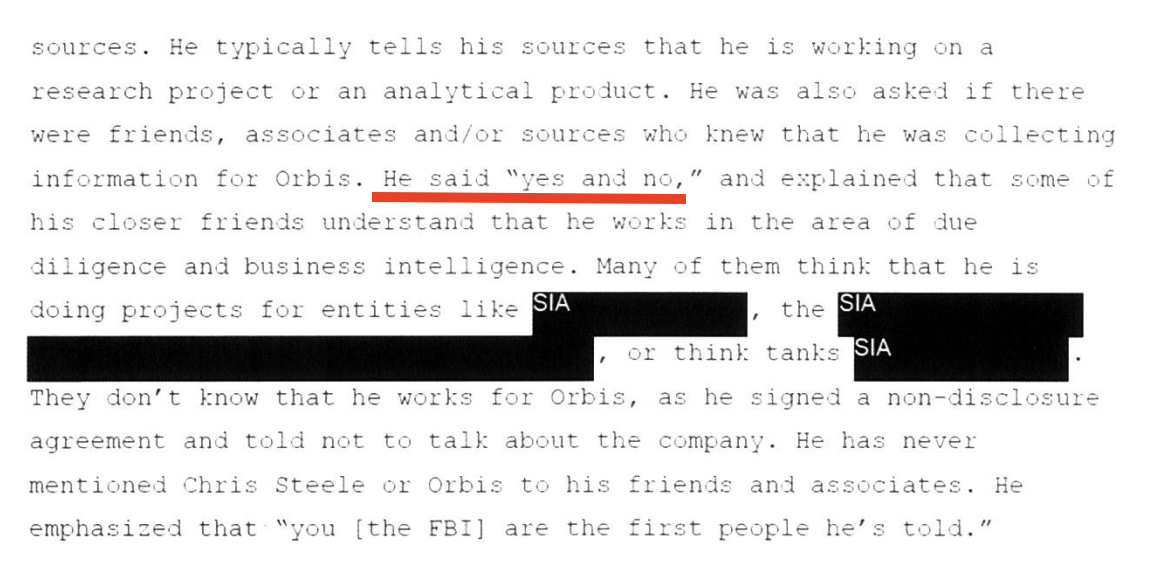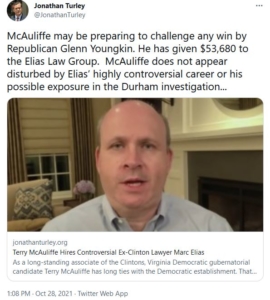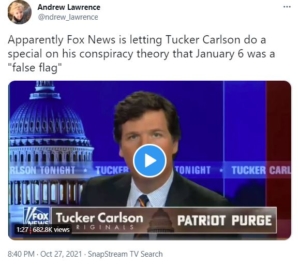John Durham’s Cut-and-Paste Failures — and Other Indices of Unreliability
It would be unfortunate if the press corps responded to evidence that significant numbers of reporters had uncritically magnified the Steele dossier by uncritically magnifying other demonstrably unreliable documents. Yet that is what has happened in response to the Igor Danchenko indictment, today in fairly notable form in a Bill Grueskin op-ed in the NYT.
Grueskin calls for more reporting
To be clear, the conclusion of Grueskin’s op-ed (like the dossier’s conclusion that members of the Trump campaign were in contact with key players in the Russian election operation and the DOJ IG Report’s conclusion that the Carter Page FISA applications were badly flawed) is absolutely correct: news organizations should come clean about past erroneous reporting on the dossier and, when in doubt, should do more reporting.
[N]ews organizations that uncritically amplified the Steele dossier ought to come to terms with their records, sooner or later. This is hard, but it’s not unprecedented. When The Miami Herald broke the news in 1987 that the Democratic presidential candidate Gary Hart was seeing a woman other than his wife, the paper followed that scoop with a 7,000-plus-word examination of its investigation, which showed significant flaws in how the paper surveilled its target.
[snip]
Newsrooms that can muster an independent, thorough examination of how they handled the Steele dossier story will do their audience, and themselves, a big favor. They can also scrutinize whether, by focusing so heavily on the dossier, they helped distract public attention from Mr. Trump’s actual misconduct. Addressing the shortcomings over the dossier doesn’t mean ignoring the corruption and democracy-shattering conduct that the Trump administration pushed for four years. But it would mean coming to terms with our conduct and whatever collateral damage these errors have caused to our reputation.
In the meantime, journalists could follow the advice I once got from Paul Steiger, who was the managing editor of The Journal when I was editing articles for the front page. Several of us went to his office one day, eager to publish a big scoop that he believed wasn’t rock solid. Mr. Steiger told us to do more reporting — and when we told him that we’d heard competitors’ footsteps, he responded, “Well, there are worse things in this world than getting beaten on a story.”
As someone who first raised concerns about the provenance of the dossier on January 11, 2017, caught a lot of grief for a long piece calling out real errors in it on September 6, 2017, and started raising concerns about disinformation in the dossier on January 29, 2018, before that became the consensus among Republicans in Congress, there are still key details about the dossier that demand more attention. But they’re not the ones that are getting the most attention.
Oleg Deripaska’s role in the dossier remains largely unreported
By far the most important unreported detail about the dossier, in my opinion, is the brutal double game Oleg Deripaska was playing with Christopher Steele and Paul Manafort. Consider the following details, all readily available in the public record:
- In March 2016, per Igor Danchenko’s January 2017 interview report, Steele tasked him to collect information on Paul Manafort. Danchenko said he did not know the client for that project, but communications between Steele and DOJ’s Organized Crime expert Bruce Ohr FOIAed by Judicial Watch as well as documents leaked to Byron York show that Steele was doing work on behalf of Deripaska’s lawyers at the time (note that York mistakes a reference to Deripaska as “our favourite business tycoon” for Donald Trump).
- By early July 2016 (so after just the first dossier report), according to a footnote from the DOJ IG Report declassified for Chuck Grassley and Ron Johnson, “a [person affiliated] to Russian Oligarch 1 [[Deripaska]] was [possibly aware] of Steele’s election investigation.”
- On July 30, 2016 (so after a Deripaska associate may have learned of the dossier), according the DOJ IG Report, “Steele told Ohr that [Oleg Deripaska]‘s attorney was gathering evidence that Paul Manafort stole money from [Deripaska].”
- On August 2, 2016, according to the Mueller Report, partly in an attempt to “get whole” on the money Deripaska accused Manafort of stealing, Manafort met with Deripaska deputy Konstantin Kilimnik and discussed, in addition to how to get that debt forgiven, “the state of the Trump Campaign and Manafort’s plan to win the election,” including, “discussion of ‘battleground’ states, which Manafort identified as Michigan, Wisconsin, Pennsylvania, and Minnesota,” and what Manafort described as a “backdoor” way for Russia to control eastern Ukraine.
Even as the investigator employed by Deripaska’s lawyers, Christopher Steele, was sharing Deripaska-sourced claims of Manafort’s corruption with DOJ, Deripaska was using Manafort’s legal and financial vulnerability arising from that corruption to learn how Trump planned to win the election and to recruit Manafort’s help in carving up Ukraine. Deripaska was working a brutal double game, using Steele as cover with DOJ and FBI even as he exploited Manafort’s vulnerability — which had been enhanced by Steele — to make demands on Manafort. That’s the core scandal of Steele’s actions in 2016. Yet reporters who entirely missed this story are being treated as experts on the problems with the dossier.
So I find Grueskin’s conclusion, there’s still reporting to be done, sound.
It’s just how gets there, by replicating the very problems he critiques, that I object to. In a piece complaining that journalists uncritically amplified the dossier, Grueskin uncritically relies on the DOJ IG Report on Carter Page and Durham’s indictment of Igor Danchenko.
The dossier’s credibility suffered a grievous blow in December 2019, when an investigation by the Department of Justice’s inspector general found that F.B.I. investigations “raised doubts about the reliability of some of Steele’s reports.” The F.B.I. “also assessed the possibility that Russia was funneling disinformation to Steele,” the report said, adding that “certain allegations were inaccurate or inconsistent with information gathered” by investigators.
Then, this month, a primary source of Mr. Steele’s was arrested and charged with lying to the F.B.I. about how he obtained information that appeared in the dossier. Prosecutors say that the source, Igor Danchenko, did not, as The Wall Street Journal first reported, get his information from a self-proclaimed real estate partner of Mr. Trump’s. That prompted a statement promising further examination from The Journal and something far more significant from The Washington Post’s executive editor, Sally Buzbee. She took a step that is almost unheard-of: removing large chunks of erroneous articles from 2017 and 2019, as well as an offending video.
Neither should be treated uncritically, particularly with regards to the dossier.
Indices of unreliability in the DOJ IG Report
The DOJ IG Report revealed its unreliability itself, issuing two sets of corrections in the days after its release. Two of those corrections pertained to the dossier. The first correction admitted that the Report had initially miscited Igor Danchenko’s interview report regarding a report Danchenko sourced to Sergei Millian, the key report at issue in the Danchenko indictment.
On pages xi, 242, 368, and 370, we changed the phrase “had no discussion” to “did not recall any discussion or mention.” On page 242, we also changed the phrase “made no mention at all of” to “did not recall any discussion or mention of.” On page 370, we also changed the word “assertion” to “statement,” and the words “and Person 1 had no discussion at all regarding WikiLeaks directly contradicted” to “did not recall any discussion or mention of WikiLeaks during the telephone call was inconsistent with.” In all instances, this phrase appears in connection with statements that Steele’s Primary Sub-source made to the FBI during a January 2017 interview about information he provided to Steele that appeared in Steele’s election reports. The corrected information appearing in this updated report reflects the accurate characterization of the Primary Sub-source’s account to the FBI that previously appeared, and still appears, on page 191, stating that “[the Primary SubSource] did not recall any discussion or mention of Wiki[L]eaks.”
Effectively, DOJ IG realized only after it published that it had not cut-and-pasted from Danchenko’s interview report accurately.
The second correction admitted that, in its original release, the IG Report had complained that the FBI had not integrated information that it learned from Danchenko starting on January 24, 2017 in a FISA reauthorization approved on January 12, 2017, a temporal impossibility.
On page 413, we changed the word, “three” to “second and third.” The corrected information appearing in this updated report reflects the accurate description of the Carter Page FISA applications that did not contain the information the FBI obtained from Steele’s Primary Sub-source in January 2017 that raised significant questions about the reliability of the Steele reporting. This information previously appeared, and still appears, accurately on pages xi, xiii, 368, and 372.
These corrections show that DOJ IG got all the way through its initial release without noticing sloppiness of the sort it found inexcusable from the FBI.
But the far more important change DOJ IG made after first publication — one that still has not been fully corrected — is that all the way through its initial release, IG investigators had misdescribed what crimes the FBI team was investigating, conflating FARA and 18 U.S.C. § 951. The error was absolutely critical, because the investigation into Carter Page was initially opened because he was willingly sharing non-public economic information with people he knew to be Russian intelligence officers. Page would have already passed certain First Amendment review required for a FARA case before the case was picked up by the Crossfire Hurricane team. The correction should have, but did not, lead to wholesale reconsideration of the First Amendment discussion in the IG Report. Relatedly, the IG Report still includes an uncorrected miscitation to a Senate Report on the statute in question, to a passage that explained that an American could be targeted for First Amendment activities if he was — as Carter Page had been prior to 2016 — “acting under the direction of an intelligence service of a foreign power.”
Incidentally, John Durham replicated this error in the first document formally filed as part of his investigation, the Kevin Clinesmith information, revealing that 15 months into his investigation into Crossfire Hurricane, he didn’t even know what crimes Crossfire Hurricane had been investigating.
The corrections the IG Report made are not the only evidence that it is not entirely reliable. The report included a number of omissions, just like the Carter Page FISA applications did. For the purposes of this post, the most important are that it made no mention of the contacts Christopher Steele and Bruce Ohr had before July 30 during 2016 — contacts that focused on Deripaska; it left out one topic of their discussion on July 30, Russian doping; and it misrepresented Ohr’s key role in providing derogatory information about Steele to the FBI that they used to vet the dossier. In other words, DOJ IG misrepresented some of the relevance of Oleg Deripaska to the Russian election operation, which may be why that remains an unreported aspect of Steele’s role in 2016.
Indices of unreliability in Durham’s Danchenko indictment
Grueskin’s — and much of the media’s — uncritical reliance on the Danchenko indictment raises still further problems. Of course, all DOJ press releases on indictments, including the one announcing Danchenko’s charges, emphasize that, “Charges contained in an indictment are only allegations.” And as reporters learn early on, prosecutors (more often state and local prosecutors, but Federal prosecutors are not immune) often make allegations that aren’t backed by the facts.
We won’t be able to fully assess the allegations that Durham has made against Danchenko until Danchenko either pleads guilty or goes to trial.
But there are three reasons not to treat this indictment as credible without further proof:
- It fails to represent transcripts faithfully
- It relies on Sergei Millian’s Twitter account as evidence for a key allegation
- A number of its most newsworthy allegations are not actually charged
Durham’s misrepresentation of Danchenko’s alleged lies
Durham’s indictment of Michael Sussmann, unusually for a false statements indictment, does not quote the lie that Sussmann is alleged to have told.
By contrast, Durham does provide transcripts for some, but not all, of the lies he charges in the Danchenko indictment, though in the actual charges, he usually relies on a few words rather than the full statement of Danchenko’s alleged lie.
That means we can test Durham’s reliability by comparing the actual transcripts with how Durham describes the alleged lies in his charges. (Durham does not include the interview report for the uncharged January 24 allegation below, but it is publicly available, and Durham provided neither a transcript nor summary of Danchenko’s language relating to a November 16, 2017 interview.)
In each case, Durham’s charged lies leave out key caveats or context that appear in the actual transcripts.
In his (uncharged) allegation that Danchenko falsely claimed, on January 24, 2017, that he hadn’t told any of his associates he “worked for Chris Steele or Orbis,” Durham didn’t explain that this was a question specifically about whether Danchenko’s friends knew he collected intelligence for Orbis, not whether he knew Steele at all, nor does he reveal that Danchenko responded to the question, “yes and no.”
In the Millian-related charge pertaining to a recorded March 16, 2017 interview, Durham claimed that Danchenko “well knew” that Millian had never called him, omitting that Danchenko actually stated that “I don’t know” whether he really spoke to Millian.
In the Millian-related charge pertaining to a recorded May 18, 2017 interview, Durham omitted several key details, including that Danchenko was describing what he believed, “at the time,” (in 2016) and that he was “not sure” if Millian really called.
In the single charge relating to Charles Dolan, Durham omitted that the first question the FBI Agent asked Danchenko about Dolan on June 15, 2017 appears to pertain to whether Dolan was a source for Steele, not whether he was a source for Danchenko. It also omits Danchenko’s caveat that he and Dolan had “talked about … related issues” to the dossier, though not anything “specific,” which is not a categorical denial that he spoke to Dolan about “any material contained” in the dossier.
In a Millian-related charge pertaining to an October 24 interview (Durham doesn’t say whether this was recorded), Durham omits that Danchenko caveated his answer by saying that the caller “was someone who I thought” — again reflecting his belief in 2016, not in 2017 — was Millian.
These omissions don’t doom Durham’s case; they don’t mean Danchenko didn’t lie. But they do show that Durham left out key language and context in the language charging these as lies.
Durham may well prove his case (the Dolan charge is, in my opinion, the strongest one), but his failures in cutting and pasting the language from the transcripts accurately suggests he cannot be relied on uncritically as a source about what really happened.
Sergei Millian’s Twitter feed is no more reliable in an indictment than outside it
All the more so given that Durham, remarkably, relies on Sergei Millian’s Twitter feed as one of the few pieces of proof that the call Danchenko believed to have come from Millian did not take place.
Chamber President-I has claimed in public statements and on social media that he never responded to DANCHEKNO’s [sic] emails, and that he and DANCHENKO never met or communicated.
Durham presents just two other pieces of evidence that the call didn’t take place, both of which post-date the first dossier report purportedly based on the call (meaning neither is proof, at all, that Danchenko didn’t believe Millian was the caller at the time he submitted the report to Steele). And he leaves out a communication Danchenko had that may corroborate the call (or at least Danchenko’s contemporaneous belief it did).
Unless there are FBI interviews with Millian that Durham is obscuring (he’s not obscuring Dolan’s interviews), it is fairly unbelievable that Durham presented this Twitter allegation to a grand jury, because it is not remotely admissible for the facts claimed at trial. Durham appears to be treating Millian — whom FBI also had a counterintelligence investigation on in 2016 — as a fact witness without requiring Millian undergo the same kind of FBI exposure that Danchenko was willing to.
That, itself, is newsworthy, because it reflects poorly on the seriousness of Durham’s case.
Journalists treating Durham’s Twitter-based allegations as credible should ask themselves why they hadn’t, themselves, treated the very same Millian assertions as credible four years earlier, before this indictment. The answer is obvious: because Twitter feeds aren’t normally sufficient proof, for prosecutors or journalists, of any fact beyond that a statement was made. Yet journalists are now taking the appearance of this Twitter claim within an indictment as proof that it is true.
Durham’s uncharged allegations
The last reason why Durham’s Danchenko indictment should be treated with skepticism is more technical but one that has been the key source of bad reporting on it.
Durham charged five false statements, a single charge relating to Charles Dolan, and four counts charging the same lie about a Sergei Millian call allegedly made in four different FBI interviews (one instance of this claimed lie, made in January 2017, is not charged).
Durham also made another allegation that he didn’t charge — the alleged lie on January 24 regarding whether Danchenko told others he was collecting intelligence for Steele.
And Durham presented, as materiality arguments, three dossier reports that Durham doesn’t allege Dolan was the direct source for, but instead, describes that he, “was otherwise involved in the events and information described in the reports.” Here’s how Durham justifies including the allegations about the pee tape as a materiality claim.
Based on the foregoing, DANCHENKO’s lies to the FBI denying that he had communicated with PR Executive-I regarding information in the Company Reports were highly material. Had DANCHENKO accurately disclosed to FBI agents that PR Executive-I was a source for specific information in the aforementioned Company Reports regarding Campaign Manager-1 ‘s departure from the Trump campaign, see Paragraphs 45-57, supra, the FBI might have taken further investigative steps to, among other things, interview PR Executive-I about (i) the June 2016 Planning Trip, (ii) whether PR Executive-I spoke with DANCHENKO about Trump’s stay and alleged activity in the Presidential Suite of the Moscow Hotel, and (iii) PR Executive-1 ‘s interactions with General Manager-I and other Moscow Hotel staff. In sum, given that PR Executive-I was present at places and events where DANCHENKO collected information for the Company Reports, DANCHENKO’s subsequent lie about PR Executive-1 ‘s connection to the Company Reports was highly material to the FBI’ s investigation of these matters.
Durham doesn’t claim that Dolan was the source for the pee tape (though a number of media outlets have claimed he did, even while complaining about bad reporting on the dossier). A likely — and damning — potential explanation is that Danchenko learned from Dolan the name of Ritz Hotel staffers and then used their names, without interviewing them, to make the pee tape rumor Danchenko sourced to a Russian friend of his look more credible. But there’s no hint that Dolan willfully participated in the manufacture of the pee tape report (indeed, the indictment provides several reasons to believe he did not). Durham actually doesn’t even claim that he knows what Dolan’s role was in the pee tape, other than inviting Danchenko to the Ritz for lunch. For example, he may not be able to rule out that, after getting the names of Ritz staffers from Dolan, Danchenko interviewed them. Nor does Durham claim to know what happened with the other two Dolan-related allegations he includes as materiality arguments.
But based off a long narrative presented as a materiality argument, not a separate charged crime (it’s all part of Danchenko’s alleged denial of discussing anything specific that appeared in the dossier), multiple reporters have claimed that there are charges, plural, tied to Dolan and that a Clinton associate had a role in manufacturing the pee tape claim. Neither claim is supported by the Danchenko indictment, but the misimpression may be what Durham was hoping to accomplish by including it.
Durham did something similar in the Sussmann indictment, and as lawyers for both Sussmann and Danchenko have noted, the move impermissibly presents Rule 404(b) information in an indictment, information about motive or other bad acts that might be presented at trial with prior approval from the judge to help prove the case. By doing it, Durham skirts a DOJ rule (the one Jim Comey broke in 2016) against making public allegations that DOJ is not prepared to prove beyond a reasonable doubt.
Effectively, these materiality claims are the equivalent of journalistic scoops that aren’t rock solid that — Paul Steiger told Grueskin years ago — require more investigation before charging or reporting. These materiality claims are no more substantive than the reports in the Steele dossier.
And yet some in the press are treating them as such, most often by treating them (or at least the pee tape one) as a separate charge, and claiming that Durham has alleged something about the pee tape that he has not.
Durham’s Danchenko indictment may one day prove — like the dossier, the DOJ IG Report, and Grueskin’s op-ed — generally right, even if some of the facts in it are wrong.
But it hasn’t yet proven any more reliable, with regards to specific facts, than the dossier itself. And there are several signs that it is not reliable.
It would be a mistake to respond to the bad reporting on the dossier by replicating the same bad habits with the Danchenko indictment.
Danchenko posts
The Igor Danchenko Indictment: Structure
John Durham May Have Made Igor Danchenko “Aggrieved” Under FISA
“Yes and No:” John Durham Confuses Networking with Intelligence Collection
Source 6A: John Durham’s Twitter Charges
John Durham: Destroying the Purported Victims to Save Them
John Durham’s Cut-and-Paste Failures — and Other Indices of Unreliability

